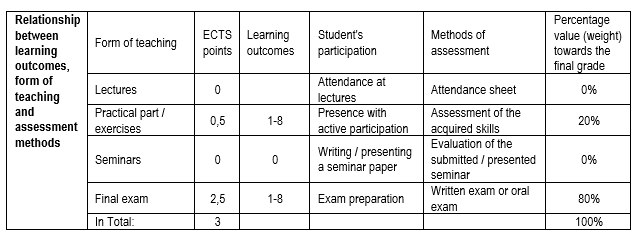Acquirement of basic knowledge and skills necessary for conducting physiotherapeutic estimation and determination of needs for physical therapy. By mastering if the course content, a student will acquire basic terms in physical therapy, planning process and organisation in physical therapy. Acquirement of knowledge and skills necessary for understanding and acquirement of course content in narrow specialised discipline.
Introduction to physical therapy, P-30: Scope of physiotherapists’ work and physiotherapists’ role in modern physical therapy; physiotherapeutic approaches and their varieties. Teamwork and preconditions for teamwork; models of teamwork. Types of physiotherapeutic unit’s organisation. The role of research in physical therapy.
Physiotherapeutic assessment, P-60: Subjective examination, anamnesis, observation, palpation and measurement procedures and tests in physical therapy.Anthropometric measures, measurement of aerobic capacity and endurance, assessment of integrity and joint mobility, measures of motion range, muscle strength measures – manual muscles test, dynamometry, testing of isometric and isoclinic muscle strength; posture assessment; pain assessment; skin integrity assessment; reflex activity assessment; assessment of activities of everyday life and instrumental activities in everyday life; walk assessment, locomotion and balance; ergonomic and biomechanical assessment; assessment of usage of additional and adaptive means; specific physiotherapeutic methods and assessment systems, documentation and interpretation of assessment results, and their usage in planning of physiotherapeutic interventions.
Obavezna literatura:
Upon completion of this course, students will be able to:
- Justify and judge the scope of work of a physiotherapist
- Assess the roles of physiotherapists in the clinical setting
- Recommend and identify different models of teamwork
- Determine the specifics of the physiotherapy approach in working with different groups of patients
- Determine the role of research in physiotherapy
- Recommend and valorize the implementation of subjective and objective physiotherapy assessment procedures
- Arguably present opinions and assessments of documentation and interpretation of the results of physiotherapy assessment
- Evaluate and compare the specifics of the physiotherapy approach in working with different groups of patients



